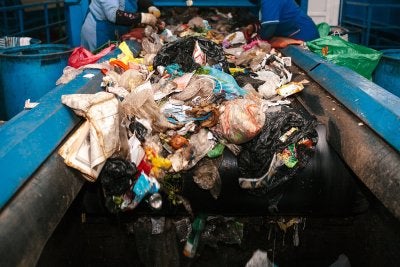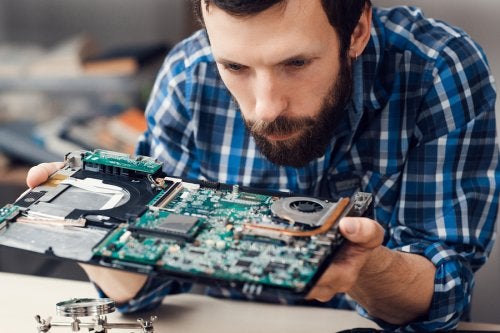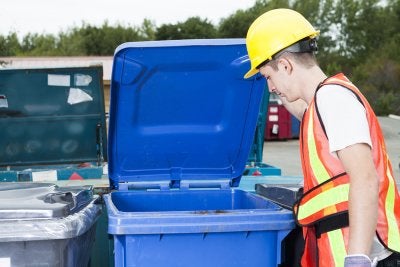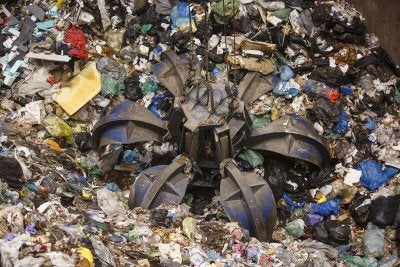-
Understanding LEED Construction Waste Management Requirements
When you are seeking LEED certification for your next building project, make sure to read up on the construction waste management requirements that are included as a part of the LEED program. In order to qualify for LEED certification, a contractor must recycle a certain percentage of waste that is generated during the building process. By scheduling trash pickup and recycling serving Atlanta, you can make sure that your waste management protocol is in accordance with LEED certifications. Let’s take a look at some LEED construction waste management requirements that you may want to keep in mind for your next jobsite.

Identify Sources of Construction Waste
The first step of creating a construction waste management plan that follows LEED guidelines is to identify the site’s main sources of waste. Some examples of construction waste include cardboard, scrap metal, and excess timber. Once these waste sources have been identified, the team of contractors can create a sustainable recycling plan for the construction site.
Exclude Materials That Do Not Qualify
Under LEED guidelines, there are certain types of waste materials that do not qualify for the program. Materials that cannot be recycled or reused in order to qualify for LEED credits include soil or materials that have been unearthed during the land clearing process. While these materials should be disposed of in an environmentally friendly manner, they cannot be counted towards a construction site’s total amount of recycled or salvaged materials.
Calculate Construction and Demolition Material Streams
LEED guidelines state that construction sites must divert a minimum of fifty percent of their construction or demolition materials to recycling facilities. If your site will be relying on a three-stream recycling protocol, you must recycle 50 percent of your total construction materials. Sites that rely on four-stream recycling protocols are required to recycle at least 75 percent of their total waste. By providing the U.S. Green Building Council with documentation of your green waste management efforts, you will gain points towards your building’s eventual LEED certification.
-
Examining the Impact of Recycling
Recycling a single water bottle can have a major impact on the health of the planet. In this video from Seeker, you will take a look at the importance of recycling around the globe. When plastic bottles are sent to a recycling center serving Atlanta , they can be processed and reused to create new items. By contrast, a plastic bottle that is tossed in the trash will never biodegrade, and will, instead, take up space in the landfill.
After you have learned some essential recycling facts, you may be tempted to recycle at your home or business. With services from a qualified waste management company, you will be able to set up an effective and simple recycling program that helps you to reduce, reuse, and recycle your materials.
-
Factors to Consider When Building Your Industrial Waste Management Plan
Many industrial processes produce high volumes of waste, some of which can be hazardous to humans and the environment. Therefore, you will need to work with a waste management company to schedule routine trash pickup and industrial waste removal . With services from a company that offers waste management and recycling serving Atlanta, you can rest assured that your industrial waste is being disposed of in a safe and effective manner. Read on for a closer look at three factors to consider when you are building your industrial waste management plan.

Waste Collection Methods
One of the most critical considerations for any industrial waste management plan is how the trash debris will be collected at the site. To achieve the best efficiency from your waste management plan, you should attempt to collect waste as soon as it is generated in your factory or plant. By strategically placing trash cans, recycling containers, and other receptacles around your site, you will be able to ensure that waste is collected soon after it is created.
Employee Training Protocols
An industrial waste management plan will only be as effective as the employees who are implementing the program. Without proper training and education, your workers may not know how to properly use your new trash receptacles or recycling bins. After you have planned out your industrial waste management scheme, take the time to correctly educate your employees on how to properly dispose of waste.
Trash Pickup Schedules
A final consideration for your industrial waste management plan is your trash pickup schedule. If your industrial facility generates large volumes of waste, you may need to schedule pickups for routine intervals throughout the week. A company that specializes in waste management services will be able to help you create a trash removal schedule that reduces waste on your site and prevents the unnecessary buildup of trash or recyclables. Your trash pickup schedule will need to be customized to the unique needs of your facility.
-
A Look at How Electronic Waste Is Recycled
Every year, up to 50 million tons of electronic waste products are thrown into landfills. In this video from Tom Mills, you will learn all about the importance of electronic waste recycling. Electronic devices contain harmful materials, which can be safely eliminated through the recycling process. A company that provides recycling bins in Atlanta can help you to create an E waste recycling program for your business.
If you are looking for a safe way to get rid of your old computer, television, or cellphone, do not hesitate to get in touch with a local recycling center. When you recycle, rather than toss, your electronic items, you can create valuable metal recycling resources. E waste recycling is also an effective strategy for keeping hazardous metals and chemicals out of the environment.
-
A Look at Electronics Stewardship
In today’s fast-paced world, businesses and educational facilities must continually update their electronics and other devices. In order to improve the recycling efforts of your company, you may want to embark on an electronics stewardship program. By focusing on electronics stewardship, you will be able to lead the way for sustainable electronic recycling and repurposing methods. A company that specializes in recycling serving Atlanta can help you create an effective electronics recycling program for your facility.
Electronics stewardship encompasses more than just recycling. Along with choosing to recycle your old electronic devices, you may also consider donating them to worthy organizations. Many nonprofits, schools and other institutions can benefit from receiving electronics that would otherwise be tossed into recycling bins. Eligible workers can also be trained with skills that allow them to rehabilitate older electronic devices, such as computers. By creating jobs and reducing waste, electronics stewardship represents the future of sustainability.

-
The Benefits of Initiating a Recycling Program for Your Apartment Building
When you own or manage an apartment building, your waste management and recycling strategies will impact the daily lives of many other families. If your apartment complex currently does not offer recycling services, you may want to consider setting up a program that allows every tenant to recycle. By renting recycling bins in Atlanta , it will be possible to create an apartment recycling program that is manageable and simple for every tenant who lives in your building. Let’s take a closer look at some of the benefits of initiating a recycling program for your apartment building.

Cut Down on Costs
One of the top benefits of setting up a recycling program in your apartment building is that consistent recycling can help to save you and your fellow tenants money on your trash pickup fees. Typically, apartment residents must pay a monthly fee to have their trash picked up by a waste management company. When you commit to a recycling program, you can cut back on the costs that are associated with your trash pickup.
Improved Sense of Community
Implementing a new recycling program is a terrific way to build a stronger sense of community amongst your fellow tenants. By encouraging the members of your apartment building to recycle, you can help to create a sense of teamwork and cooperation. After you and your fellow residents have recycled consistently for several months, you may even find that your apartment building offers the sense of an improved quality of life.
Reduced Environmental Impact
Whether your goal is to help your apartment building to go green, or you simply want to cut down on waste and reduce energy consumption, a recycling program will help to improve the environmental impact of your residence. Having a structured recycling program can even help to attract new tenants who are committed to helping the environment and improving their surroundings. Overall, you will find that your apartment building produces much less landfill waste after your recycling program has been implemented.
-
Tips for Reducing Commercial Kitchen Waste
Commercial kitchens are notorious for generating large amounts of waste. From uneaten dishes to food preparation scraps, your restaurant may create excess amounts of wasted materials that are thrown out every single day. A company that offers waste management and recycling serving Atlanta can help you audit your restaurant’s trash and recycling in order to create an effective strategy for waste reduction . To help you reduce, reuse, and recycle in your kitchen, read these tips for reducing commercial kitchen waste.

Monitor Your Fresh Produce
When fresh produce goes bad, it will have to be thrown in the trash. Since spoiled produce items can make up a large portion of your restaurant’s daily food waste, it is essential that you monitor your fresh produce order daily. By ordering only what you need for your daily service, you can cut back on the amount of food that you end up tossing out at the end of the week. You can also keep your produce from spoiling by using older items first, before they start to go off.
Manage Your Temperature Control
Keeping food items at the correct temperature is a critical aspect of food service safety. If your refrigerator or freezer is not dialed to the right setting, you may end up throwing out a week’s worth of food that has gone off. To reduce commercial kitchen waste, you will need to make sure that all of your workers are aware of the importance of proper temperature control in your kitchen.
Create a Recycling Program
Many of the pantry items in your kitchen will come to you in cardboard boxes or other packages that can be recycled. If you are looking for an effective strategy for reducing commercial kitchen waste, you may want to create a recycling program for your employees. During each shift, your workers can break down boxes, wash out cans, and prepare other types of packages for the recycling bin. Recycling, rather than throwing out, these items will dramatically improve your restaurant’s environmental footprint.
-
What You Should Know About Industrial Hazardous Waste Disposal
If your industrial processes create hazardous waste, it will be your responsibility to make sure that these potentially toxic and harmful materials are disposed of in a safe and environmentally friendly manner. Rather than creating a hazardous waste management plan on your own, you can hire a company that specializes in waste disposal and recycling near Atlanta. Your waste management team will help you create a safe and effective solution for effectively processing your hazardous waste. Read on for a look at what you need to know about industrial hazardous waste disposal .

Hazardous waste should be reduced whenever possible.
While it may not always be possible to completely reduce or eliminate the amount of hazardous waste that is generated by your business, it is important to cut down on your hazardous waste generation whenever possible. To reduce the quantity of hazardous materials that are created by your business, you can look for ways to substitute hazardous items with non-toxic products. It may also be possible to upgrade your industrial equipment with parts and equipment that cut down on hazardous waste.
Hazardous waste must be disposed of in accordance with regulations.
Federal regulations mandate that industrial hazardous waste must be disposed of using proper methods and materials. If you neglect to follow your federal or local waste disposal guidelines, you could end up facing steep fines and other penalties. A waste management company in your area will be able to answer any questions that you may have about industrial waste disposal for your business.
Hazardous waste needs to be placed in the proper receptacles.
When hazardous waste enters the water supply or soil that surrounds your industrial facility, it can create serious environmental problems. To protect the environment and prevent serious repercussions, industrial facilities must place their hazardous waste in designated trash receptacles. If you are uncertain about how to safely manage the industrial waste that is created by your company, do not hesitate to consult with an experienced waste management professional.
RECENT POSTS
categories
- Uncategorized
- Waste Management Atlanta
- Waste Disposal and Recycling
- Hazardous Waste Disposal
- Chemical waste removal
- solid waste removal
- R3 Program
- Sustainable Organizations
- Sustainable Waste Removal
- Commercial Waste Removal
- Materials Management Program
- Dumpster Rental
- Roll Off Dumpsters
- Construction Site Waste Removal
- Sustainability
- Recycling in Atlanta
- Industrial Recycling
- Industrial Waste Removal Services
- Southern Waste & Recycling
- Waste Removal Atlanta
- Waste Specialists
- Atlanta
- Infographic
- Front Load Dumpsters
- Rear Load Dumpsters
- Reusable Electronics
- Dump Truck Atlanta
- Recyclable Electronics
- Trash Compactors
- Recycling
- Recycling Program
- Office Recycling
- Metal Recycle
- Electronic Waste
